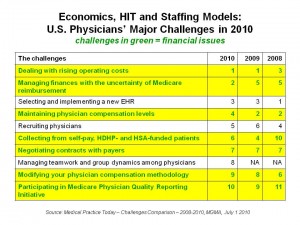 While practice economics have always been the lifeblood for doctors’ businesses, this year, 7 of their top 10 challenges have to do with some aspect of finance: rising costs, uncertainty of Medicare reimbursement, managing compensation, negotiating payer contracts, and collecting payments from patients themselves. The other key hassle in 2010 for physicians is selecting and implementing an electronic health records system, #3 in the top-of-mind challenges for American doctors.
While practice economics have always been the lifeblood for doctors’ businesses, this year, 7 of their top 10 challenges have to do with some aspect of finance: rising costs, uncertainty of Medicare reimbursement, managing compensation, negotiating payer contracts, and collecting payments from patients themselves. The other key hassle in 2010 for physicians is selecting and implementing an electronic health records system, #3 in the top-of-mind challenges for American doctors.
The Medical Group Management Association, the advocacy group for physicians working in groups, published a survey this week conducted among its members in February and March 2010.
Notice all the yellow shading in the chart? These are the 7 of the top 10 challenges for physicians that relate in some way to the difficult, varied and interconnected economic factors of being a physician in 2010.
Dealing with rising operating costs, which are increasing faster than practice revenues, is the #1 headache for doctors in the U.S., an “extreme or considerable challenge” for 3 in 4 U.S. physicians. In second place, and related on the top-line for doctors, is managing finances with the uncertainty of Medicare reimbursement rates, a challenge shared by 70% of doctors.
Physicians told the MGMA the recession is negatively impacting them in the following ways:
The EHR selection and implementation challenge ranks third place for physicians, with 58.6% of U.S. physicians rating this a considerable or extreme challenge in 2010.
Challenges which ranked lowest for physicians included complying with regulations such as Stark requirements, dealing with hospital physician credentialing, and implementing social media tools to connect with patients, cited by 23% of physicians.
Heath Populi’s Hot Points: The recession is negatively impacting all players in the economic system, including physicians. There is great uncertainty surrounding the issue of Medicare payments to physicians. Furthermore, health plans are losing membership and trying to negotiate favorable payment terms with providers — that is, they’ll try to ratchet payments downward. Physicians will respond by aligning more closely with each other (through mergers, affiliations and consolidation) and with the hospitals they favor with their inpatient admissions.
At the same time, physicians have the carrot-incentive of ARRA HITECH stimulus funding for EHR adoption in the front-view mirror for 2011-2014. This issue ranked 3rd after the two key economic challenges doctors are facing in the short-term. Health IT companies will need to develop creative financing packages, including going at-risk for meaningful use, to get doctors’ attention and business in this economic environment.
For physicians, there will be safety in numbers — all numbers, from growing into larger practices to realizing improved economies of scale to adopt health IT, access fair-priced malpractice insurance, and get access to capital in tight money markets.




 I am so grateful to Tom Lawry for asking me to pen the foreword for his book, Health Care Nation,
I am so grateful to Tom Lawry for asking me to pen the foreword for his book, Health Care Nation,  I love sharing perspectives on what's shaping the future of health care, and appreciate the opportunity to be collaborating once again with Duke Corporate Education and a global client on 6th May. We'll be addressing some key pillars to consider in scenario planning such as growing consumerism in health care, technology (from AI to telehealth), climate change, and trust -- the key enabler for health engagement or dis-engagement and mis-information. I'm grateful to be affiliated with the corporate education provider
I love sharing perspectives on what's shaping the future of health care, and appreciate the opportunity to be collaborating once again with Duke Corporate Education and a global client on 6th May. We'll be addressing some key pillars to consider in scenario planning such as growing consumerism in health care, technology (from AI to telehealth), climate change, and trust -- the key enabler for health engagement or dis-engagement and mis-information. I'm grateful to be affiliated with the corporate education provider  Thank you FeedSpot for
Thank you FeedSpot for